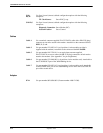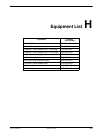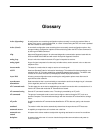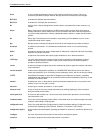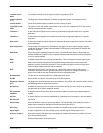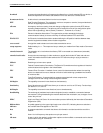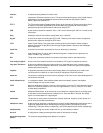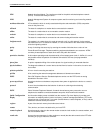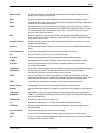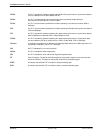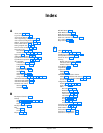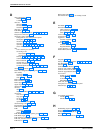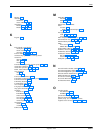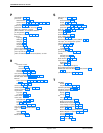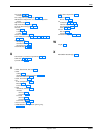
COMSPHERE 3900 Series Modems
Glossary-6 September 1998 3910-A2-GN32-40
Network Interface Module. The interface provided for the public switched telephone network
(PSTN). There are two NIMs per carrier.
Network Management System. A computer system used for monitoring and controlling network
devices.
VF line distortion which is usually associated with pulse-code modulation (PCM) compandor
noise on the phone line.
The state of a telephone or modem that is connected to the network.
The state of a modem that is not connected to another modem.
The state of a telephone or modem that is not connected to the network.
The state of a modem that is connected to and communicating with another modem.
The modem is in a state where it is ready to transmit a call. In a dial network, it is the modem
that makes the call. In a leased-line network, it is one of two sides of the network that is selected
to be the originating modem.
A way of checking data accuracy by counting the number of bits that have a value of one.
Private Branch Exchange. Telephone switching equipment dedicated to one customer. A PBX
connects private telephones to each other and to the public dial network.
A dial modem operating mode characterized by a fixed output power level of –9 dBm. It is one of
two possible modes of operation for modems connected to dial lines (see programmable
interface).
A rapid or repeated shifting of the relative phase of a signal resulting in unwanted distortion.
The diagnostic address of a control device derived from its location in the carrier; its carrier and
slot number.
A line or circuit connecting two stations.
A list containing the network management addresses of downstream modems.
Plain Old Telephone Service. Standard telephone service over the PSTN, with an analog
bandwidth of less than 4 KHz.
A test that checks most hardware components when power is applied to the device or a reset is
initiated.
A set of rules that determines the behavior of devices in achieving and maintaining
communication.
Public Switched Telephone Network. A network shared among many users who can use
telephones to establish connections between two points. Also known as dial network.
An informative display screen available from the modem’s Top-Level display. It provides such
information as network position (control or tributary), network management address, DTE mode
(Asynchronous or Synchronous), Line mode (Leased Answer, Leased Originate, or Dial), and the
modulation scheme used by the modem.
A part of the device’s memory that holds stored values.
Files, devices, and users not attached to your local DTE.
A test that sends a signal to the remote modem to test the local modem, the remote modem, and
the circuit between them.
An asynchronous message (in either numbers or words) that the device sends to the DTE after
executing or trying to execute a command.
NIM
NMS
nonlinear distortion
off-hook
offline
on-hook
online
Originate mode
parity
PBX
permissive interface
phase jitter
physical address
point-to-point line
poll list
POTS
power-up self-test
protocol
PSTN
Quick Configuration
display
register
remote
remote loopback
result code



